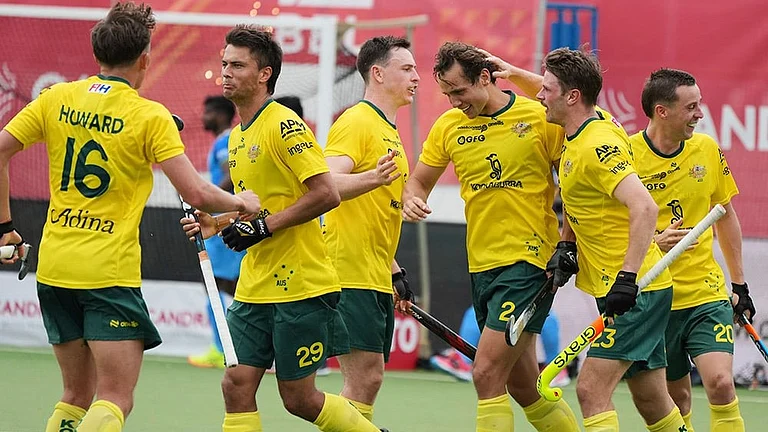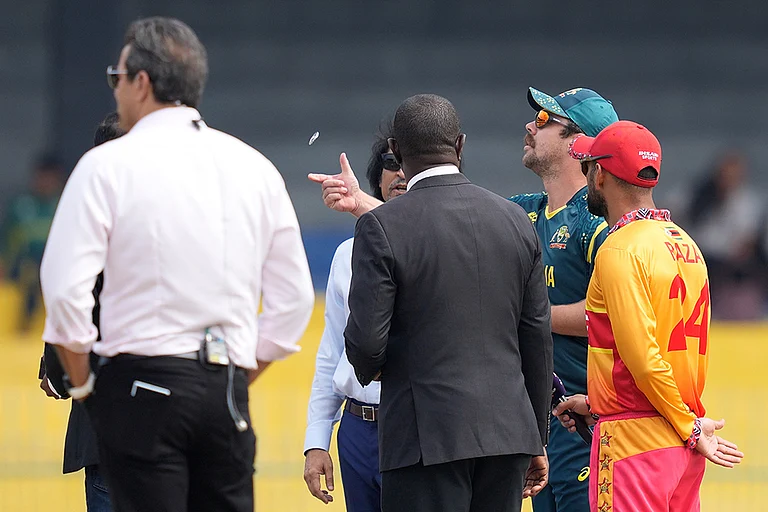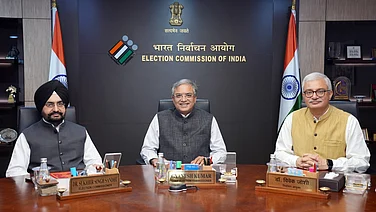A five-judge constitution bench comprising Chief Justice D Y Chandrachud and Justices S K Kaul, S R Bhat, Hima Kohli and P S Narasimha continued hearing arguments seeking legal recognition for same-sex marriages for the sixth day.
If the court rules in favour of the petitioners who are around 18 same-sex couples, at least three of them with kids, then India will become the first country in South Asia, and the second country in Asia after Taiwan, to legalize same-sex marriage.
Over the past few days, important arguments, observations and comments were made during the hearings. Here is a look at some of them:
Forced conversion therapy
Arguring for the petitioners, Advocate Vrinda Grover said that marriage would provide the necessary legal shield for the people who experience violence from their natal families.
“During Covid, when trans persons went back to their home…some were subjected to forced conversion therapy and violence at the hands of their natal families. What we are canvassing before this court is a new imagination of marriage, family and love care respect is the foundation of this new concept," Advocate Vrinda Grover said.
The advocate was representing petitions that cover broadly two groups - queer activists, and couples in relationships involving Trans persons and cis heterosexual persons. The particular petition is about marriage and relational equality.
"A study says that several transgender persons who went home due to covid, were subjected to all kinds of violence from families. That is why this form of chosen family becomes important," she further said.
Referring to the case of petitioner 1, the advocate said that she is now left with a family who does not understand or respect her sexual orientation. "She is also suffering from an illness. She needs persons who will take decisions that are in her best interest," she said.
"We are canvassing before this court a new imagination of marriage and family which is based on love, care and respect. This may not come from the natal family, which is well established from several studies," she said while concluding her submissions.
Damage to GDP
Advocate Saurabh Kirpal who was also representing the petitioners brought to fore the economic damage to the GDP when LGBTQ members leave the country.
"There are also lavender marriages... where a gay man marries a woman without revealing sexual orientation then it is cruelty of highest form but it is permitted since they are of opposite sex..also the issue of brain drain takes place if LGBTQ members have to leave the country.they constitute 7.5 percent of the GDP," he said.
Right to family comes under right to life
Senior Advocate Jayna Kothari arguing on the second petition by a transgender person Dr Akkai Padmashali, said, “This court held that it is not only two genders - not only male or female but male, female, or transgenders who could identify as any even without medical reassignment. The purpose of granting this right to self determine one's gender identity is to get legal recognition to a whole bunch of other rights including the right to marry."
Our claim is for marriage equality for all, not just for same sex couples -- she reiterated.
“In practice, despite the recognition of one's gender identity, transgender persons are unable to exercise their full legal rights for many reasons. One, despite NALSA, they still have to get medical reassignment to get documents changed...My second point is that the right to family has to be recognised under right to life under A 21.”
Narrating the ordeal of the petitioner, Kothari said that she was born male, she then faced so much violence at her parental home that she had no other option but to leave her home at 14/15 years of age and was on the streets, begging. "What does a family do? It goes to the core of our being. Our families give us not only love and care but also psychological and economical support. Can we not have the right to have our families recognised?" she asked.
Centre's arguments
Appearing for the Centre, Solicitor General Tushar Mehta told a five-judge Constitution Bench, headed by Chief Justice of India DY Chandrachud, that the court was dealing with a very complex subject that has a profound social impact.
It further said that the question of granting equal rights to marry should be left to Parliament to decide.
"The right to marry does not include the right to compel the State to create a new definition of marriage. Only the Parliament is competent to do this and therefore, this is a matter best left for it to decide,” Mehta argued.
He further said that there are many shades of gender within the LGBTQIA+ spectrum.
“In LGBTQIA+, it isn't explained what '+' means. There are at least 72 shades and categories of people in '+'. If this court were to give recognition to undefined categories, then the judgment would affect 160 laws. How will we regulate all this?” Mehta said.
“There are people who refuse to identify under any gender. How will the law recognise them, as a man or a woman? There is a category that says gender will depend on mood swings. What their gender would be in a given situation, nobody knows," Mehta added.
No positive response from parliament
Arguing for the petitioners and in response to the centre's arguments that the parliament should be left with the question of granting equal rights to Anand Grover, told the court as per Live Law, “There has been arguments on other side that it is for parliament to legislate on this. Let us see on record - Pink list India has been observing what has been happening to LGBT rights in parliament. There has been no positive response in 5 years.”
The Pink List started off as the first archive of statements supporting LGBTQ+ rights by candidates contesting the 2019 Indian parliamentary elections.
SGI draws comparison with incest
SGI Mehta argued, “Please visualise a situation five years down the line: I am attracted to someone in the prohibited relationship. Incest is not uncommon across the world and it is prohibited. Someone is attracted to the sister and claim autonomy and is doing something in private domain. Now, cannot this be challenged saying how can this be prohibited?"
In response, CJI calls it “far fetched" as “sexual orientation and autonomy cannot be exercised in all aspects of marriage". “It cannot be argued that sexual orientation is so strong that incest be allowed," he added.
Referrence to US Supreme Court case on abortion
Further arguing on the point of judicial restraint in the case of "complex issues", the SG also referred to the 2022 Dobbs v Jackson, which held that the US Constitution does not confer a right to abortion. "In doing so, the US Supreme Court overruled both Roe v Wade (1973) and Planned Parenthood v Casey (1992) which had recognised a woman's right to make reproductive choices. These judgements correctly acknowledges the limitations of judicial review."
CJI Chandrachud tells Mehta, "If you are relying on Dobbs to argue judicial restraint, then in India, we have gone far beyond that."
"Dobbs represents a view of the American SC that a woman has no control over her bodily integrity. This theory has been debunked long back in our country."
He further adds, "Don't cite Dobbs. We have gone way beyond Dobbs and fortunately so. We can at least credit ourselves that we are far ahead of our times than many of the western countries on this."
Urban, elitist concept
The centre had earlier told the Supreme Court that same-sex marriage is an “urban elitist concept” far removed from the social ethos of the country. It further said that the petitions have "far-reaching implications" and do not represent the view of the "entire population" of the nation.
In response, DY Chandrachud said that same-sex marriages cannot be termed “urban elitist concepts” just because more people from cities are coming out of the closet. The court further said that the government doesn't have data to prove the same.
Further responding to this, Grover said, “Finally about elitism- Large number of people run away from home. The origins of those people are from small towns. They come to the capital city where HC is and they need protection. They're not elitist. This notion that it is elitist is incorrect."
Earlier today, more than 30 LGBTQIA++ collectives of law school students have said the Bar Council of India resolution urging the Supreme Court not to deal with pleas seeking legalisation of same sex marriage is "antithetical" to the Constitution.
The apex bar body, on April 23, had expressed its concern on the same sex marriage issue being heard in the Supreme Court, saying it would be "catastrophic" to overhaul something as fundamental as the concept of marriage and the matter should be left to the legislature.


























